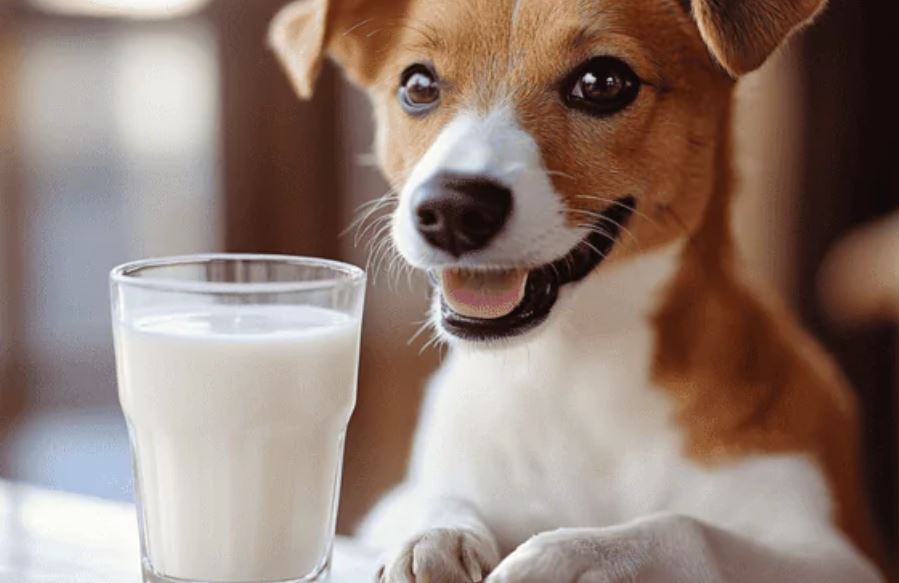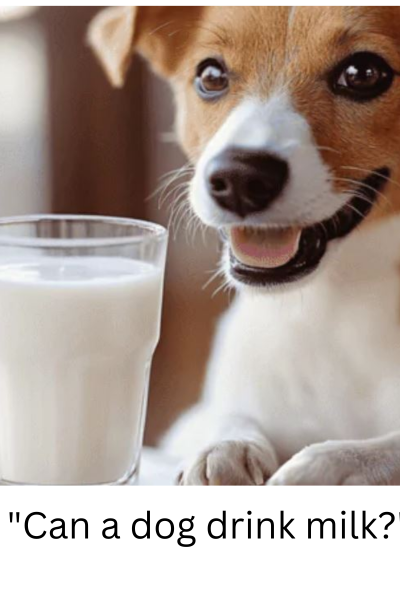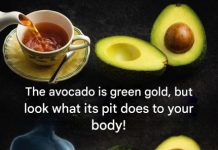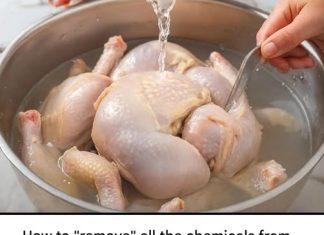In today’s article, we are exploring a common question that many dog owners have: Can dogs drink milk? While many dogs seem to love milk, it’s important to know that it may not always be the best option for them.
For some dogs, milk can lead to digestive issues, so it’s important to be cautious before offering it to your furry friend.
While milk is often considered a nutritious and healthy food for humans, with its high calcium and vitamin D content, the same doesn’t necessarily apply to dogs.

- Most dogs can handle small amounts of milk, but many are lactose intolerant—the sugar found in milk. Puppies are better equipped to digest milk because their bodies produce more of the enzyme that breaks down lactose. However, as dogs grow, their ability to produce this enzyme decreases, leading many adult dogs to struggle with digesting milk and dairy products.
Can Puppies Drink Milk?
Puppies can drink their mother’s milk, which is rich in nutrients and antibodies crucial for their development. However, once they stop nursing (around 6-8 weeks of age), they lose the ability to effectively digest lactose. Giving cow’s or goat’s milk to puppies can cause digestive issues, including diarrhea and gas. If a puppy is unable to get mother’s milk, it’s best to use commercial milk replacers specifically formulated for puppies. These replacers provide the right balance of nutrients they need during their growth.
What Causes Lactose Intolerance in Dogs?
Lactose intolerance occurs when a dog’s body does not produce enough lactase, the enzyme needed to break down lactose in milk. Without enough lactase, lactose remains undigested and moves into the large intestine, where it attracts water and causes symptoms like diarrhea, bloating, and cramps.
While puppies can digest their mother’s milk due to a higher level of lactase, many dogs lose this ability once they are weaned. This means that while puppies can handle their mother’s milk, adult dogs generally lose the ability to digest milk properly.

Symptoms of Lactose Intolerance in Dogs
If your dog drinks milk and has lactose intolerance, symptoms will appear soon after consumption. These symptoms can range from mild to severe, with the most common being:
-
Diarrhea or soft stools
-
Vomiting
-
Bloating
-
Gas
-
Stomach cramps
-
Lethargy
-
Loss of appetite
These symptoms usually show up within 12 hours after consuming milk. If you notice any of these signs in your dog after they’ve had milk, it’s best to stop offering milk and consult your vet to ensure proper diagnosis.
Is Milk Bad for Dogs?
Milk itself is not toxic to dogs, but giving them large amounts of cow’s milk is not advisable. Milk is high in fat, calories, and lactose, which can lead to a number of problems, including digestive upset, diarrhea, obesity, and even pancreatitis (inflammation of the pancreas).
While milk is not “poisonous” to dogs, it should only be given in small amounts and on rare occasions. Regularly offering milk can lead to long-term health issues like weight problems and digestive issues.
Three Health Risks When Dogs Drink Milk
While milk might seem harmless, there are a few serious health risks associated with it, especially for dogs who cannot digest lactose. Many owners are unaware that adult dogs often develop lactose intolerance, which can lead to discomfort and longer-term health problems. Here are three main health risks associated with dogs consuming milk:
-
Digestive Problems: Dogs who cannot process lactose can suffer from diarrhea, gas, bloating, and stomach cramps after consuming milk. These issues stem from the body’s inability to properly break down lactose.
-
Allergic Reactions: Some dogs may be allergic to proteins found in milk, which can cause itching, redness, rashes, and even more severe reactions like facial swelling or breathing difficulties.
-
Obesity and Pancreatitis: Milk is rich in fats and calories, so frequent consumption can lead to weight gain. Long-term overconsumption of milk could increase the risk of more serious health conditions like pancreatitis, which is an inflammation of the pancreas that can be dangerous for dogs.
How Different Dog Breeds Tolerate Dairy Products
Different dog breeds may have varying degrees of tolerance to milk. Smaller breeds, like Chihuahuas, tend to be more sensitive to milk because of their delicate digestive systems. Similarly, dogs with short snouts, such as Bulldogs and Pugs, may also struggle with digestion, including lactose intolerance.
On the other hand, larger breeds like Labradors and German Shepherds may have a slightly better tolerance to dairy, but this doesn’t mean they are immune to lactose-related issues. As with people, lactose intolerance can vary from dog to dog, regardless of breed, and the best way to figure this out is by introducing dairy products slowly and monitoring for any adverse symptoms.
How Much Milk Can a Dog Drink?
If your vet confirms that your dog can tolerate milk, it’s important to stick to small quantities. A few spoonfuls of milk occasionally should not cause major issues, but giving large amounts can quickly trigger intolerance symptoms. The general rule is that treats, including milk, should not make up more than 10% of your dog’s daily calorie intake to prevent any digestive or weight problems.

Which Types of Milk Can Dogs Drink?
Apart from cow’s milk, there are other milk alternatives that can sometimes be used as milk substitutes. Here’s what you need to know:
-
Almond Milk: While almonds are not toxic to dogs, almond milk is difficult to digest and high in fat. Small amounts of almond milk may be okay as an occasional treat, but check for harmful additives like xylitol, which is toxic to dogs.
-
Oat Milk: Oat milk is safe in small quantities since oats are harmless for dogs. However, too much can cause digestive issues.
-
Coconut Milk: Coconut milk can be given in small amounts, but dogs may become sensitive to the oil in coconut milk, which can lead to diarrhea and stomach discomfort.
-
Soy Milk: Soy milk is generally safe in small amounts, but be careful of added sugars or sweeteners.
-
Goat Milk: Goat milk contains less lactose than cow’s milk, so some dogs may tolerate it better. However, moderation is key, as excessive milk can cause digestive problems similar to cow’s milk.
Which Dairy Products Are Safe for Dogs?
Some dairy products are lower in lactose and may be safer for dogs in small amounts:
-
Yogurt: Plain, unsweetened yogurt with low lactose can be good for dogs since it contains probiotics that aid digestion.
-
Cottage Cheese: Cottage cheese has very little lactose and can be given in small amounts as a treat. It’s also high in protein and low in fat.
-
Cheddar Cheese: Cheddar cheese is low in lactose and can be given in small amounts.
What to Do if Your Dog Drinks Milk
If your dog consumes a large amount of milk, watch for symptoms like vomiting, diarrhea, or bloating. These symptoms generally appear within 12 hours. If the symptoms are severe or persistent, contact your veterinarian for advice.

What Can a Dog Drink Besides Water?
While milk and other beverages may seem appealing, water is the safest and healthiest drink for your dog. Dogs should always have access to fresh, clean water to stay hydrated.
Human beverages, such as juice, tea, coffee, and even herbal drinks, can be harmful to dogs. Many of these drinks contain sugar, caffeine, or other ingredients that are bad for dogs. Alcohol and sweetened beverages are especially dangerous and should never be given to your dog.
Important Takeaways
Many dogs cannot tolerate lactose, which can lead to digestive issues like diarrhea and bloating. If your dog can tolerate milk, it should be given in very small amounts and only occasionally to avoid potential health problems. Plant-based milk alternatives, like almond and coconut milk, may also cause discomfort due to their fat content and added sweeteners. On the other hand, certain low-lactose dairy products like plain yogurt and cottage cheese can be safe in moderation.
Always remember that water is the best drink for your dog, and avoid giving them sugary, caffeinated, or alcoholic beverages. If in doubt, consult with your veterinarian to ensure that any treats or beverages you offer your dog are safe and healthy

















